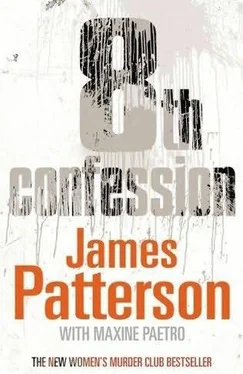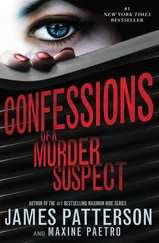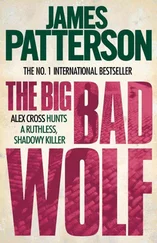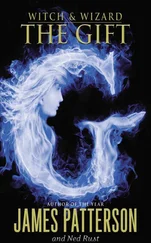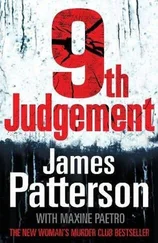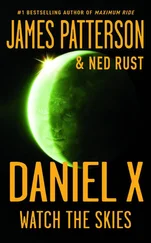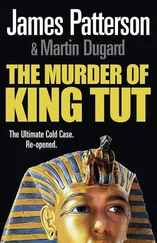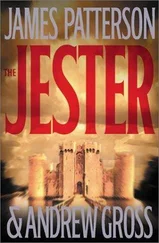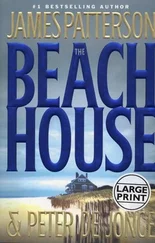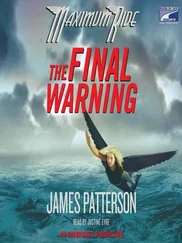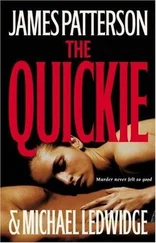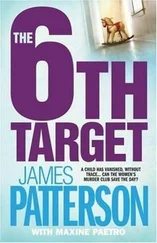“She has a solid alibi, Jacobi. Didn’t I say that?”
“You said she had an alibi, Boxer. I’m asking for details.”
There were times when reporting to Jacobi was like having bamboo slivers pushed under my fingernails. Had he forgotten we’d worked together for more than ten years?
Had he forgotten he used to report to me?
“When the killings happened, Ginny Friedman was cruising the Mediterranean on a sailing ship,” I told him. “She learned about the killings when the ship docked last week in Cannes. France.”
“I know where Cannes is,” Jacobi said, pronouncing it in the plural.
“I have Friedman’s round-trip airplane receipts and her travel documents from the Royal Clipper on my desk. The ship left port before the Baileys were killed, and it didn’t return until Brian Caine and Jordan Priestly were dead.”
“You’re sure?”
“I examined her passport,” I said. “The photo was current, and the book was properly stamped. She wasn’t in San Francisco over the last month, Jacobi, no chance. But McCorkle is checking her out anyway.”
Jacobi picked up the receiver on his phone, punched all five of his lines so no calls could come through. Then he fastened his eyes on me.
“Tell me more about this Pet Girl.”
I told Jacobi that Johnson’s father, Christopher Ross, wasn’t married to Norma’s mother, that the mother just changed the bed linens and vacuumed the floors in his Nob Hill manse.
“Ross was so rich, he was beyond scandal,” I said, “at least, while he was alive. After he died, Norma’s mother was canned and little Norma was officially an outcast.
“Her daddy left her nothing. Her friends treated her like dirt. And then she started working for them.”
“She had keys to their houses,” Conklin added, “and passwords to their security systems. She also had plenty of opportunity. What did she say, Lindsay? That nobody even knew she’d been there. That her clients liked it that way.”
“She was just ten when her father was killed?” Jacobi asked.
“Right. She couldn’t have killed those highfliers from the eighties. But the fact that her father was a victim might have inspired her.”
“Copycat,” said Jacobi.
“So we think,” I said.
Jacobi slapped his desk, and dust flew up.
“Pick her up,” he said. “Go get her.”
I SAT BESIDE Conklin at the table in the interrogation room, ready to jump in if needed, but he had the interview under control. Norma Johnson liked him, and Conklin was showing her what a good person he was, a guy you could trust – even if you were a freaking psycho.
“I don’t understand why you didn’t tell us that your father had been killed by a snake, Norma,” Conklin said.
“Yeah. Well, I would have told you if you’d asked me, but you know, I didn’t connect my father’s death to any of this until you said that the Baileys and Sara had been killed by a snake.”
“Brian Caine and Jordan Priestly? Did you know them?”
“Not well. I work for Molly Caldwell-Davis occasionally, and I’ve met Brian at her place once or twice. Jordan was there all the time, but we weren’t friends.”
“Did you work for Molly on the night of May twenty- fourth?”
“I’d have to look at my book, but no, wait. Didn’t Molly have a party on the twenty-fourth? Because I was invited. I dropped by, didn’t know anyone, so I said ‘hey’ to Molly and left after about ten minutes. She didn’t need me to walk Mischa.”
“And so your relationship with Molly was what? How would you describe it?”
“Um, business-casual. I met her through an ex-boyfriend of mine. You may have heard of him. McKenzie Oliver?”
“The rock star who died from a drug overdose?”
Norma Johnson played with the ends of her hair. “Yeah, that’s the one. We weren’t dating at the time.”
Conklin made a note in his book, asked, “Do you have any thoughts on this, Norma? Anybody jump into your mind who could’ve killed your dad and then, like, twenty-three years later, maybe killed a bunch of people you know?”
Johnson said, “No, but this is a very small town, Inspector. Everyone knows everyone. Grudges can last for generations, but even so, I don’t know any killers. I’m pretty sure of that.”
Johnson’s demeanor was low-key, bordering on snotty – and that was crazy. For the third time, she was in a small room with cops. She had to know she was a suspect. She had reason to be nervous, even if she was innocent.
She should have been asking if she needed a lawyer. Instead she was flipping her hair around and flirting with Conklin.
I made a mental note: Tell Claire to review McKenzie Oliver’s autopsy report.
And another: Find out if Norma Johnson had access to or owned a poisonous snake.
I excused myself, stepped outside the interview room, and stood with Jacobi behind the glass. Together we watched and listened as Norma Johnson told Conklin about her pedigree.
“I don’t know if you know this, but my father was the great-great-great-grandson of John C. Frémont.”
“The Pathfinder? The explorer who mapped out the route to California just ahead of the gold rush?”
“That’s the one. My bloodline is royal blue, Inspector. I’ve got nothing against the wannabes I work for, in case that’s what you’re thinking. John C. Frémont went down in history – and he started out life just like me. He was a bastard. Literally.”
“I’m very impressed, Norma. So please, help me out here. You know San Francisco like nobody else. Upstairs, downstairs, every way, and I’m on the outside. I wasn’t even born here.”
“You want to know who killed all those people? I already told you. I have no idea.”
Conklin smiled, showed his dimples. “Actually, I was going to ask you who you think might be the snake killer’s next victim.”
Johnson sat back in her chair, then cocked her head and smiled at Conklin. “The next to die? You know, my circle is getting kind of small. I’m thinking the next victim could be me.”
“Holy crap,” I said to Jacobi. “I don’t like the sound of that. What’s she planning to do?”
“Pin a tail on that donkey,” Jacobi said. “Don’t let her out of your sight.”
WE LOST PET GIRL literally right out of the box. Whether she’d gotten swept up in the foot traffic on Bryant or jumped into a cab, I didn’t know, but Conklin and I stood stupidly out on the street, blinking in the sunlight, looking for a honey-blonde in black – and seeing everything but.
“Try her phone,” I said to Conklin. “Tell her you have another question. Make a date to meet her.”
“I get it,” Conklin said. “Find out where she is.”
I grunted, “Sorry,” for my Jacobi-like behavior and watched Conklin dial and listen to Johnson’s outgoing message.
“Hi, Norma. It’s Inspector Conklin. Give me a call, okay? Got a quick question for you.”
He left his number and hung up.
“Let’s -”
“Check out her house,” he said.
I muttered, “Wiseass,” and he laughed, and we made for the car. Thirty minutes of traffic later, we parked close to the Twenty-fifth Avenue gate to the Presidio.
The Presidio has a long history, first as a Spanish fort right on San Francisco Bay, then as army housing when it was seized by the U.S. military in 1846. Nearly a hundred fifty years later, it went private, becoming a mixed-use assortment of business and residential buildings.
The renovation produced some beautiful Mission Revival-style redbrick buildings with white porches. Other housing was condemned and was gradually crumbling into the bay.
Pet Girl’s address indicated that her apartment was in the picturesque and cheapest part of the former barracks, a long walk from where we stood. And what got to me instantly was that Norma Johnson’s home was within viewing distance of Sea Cliff, where she’d gone to the Burke School – and where she’d been disgraced.
Читать дальше
